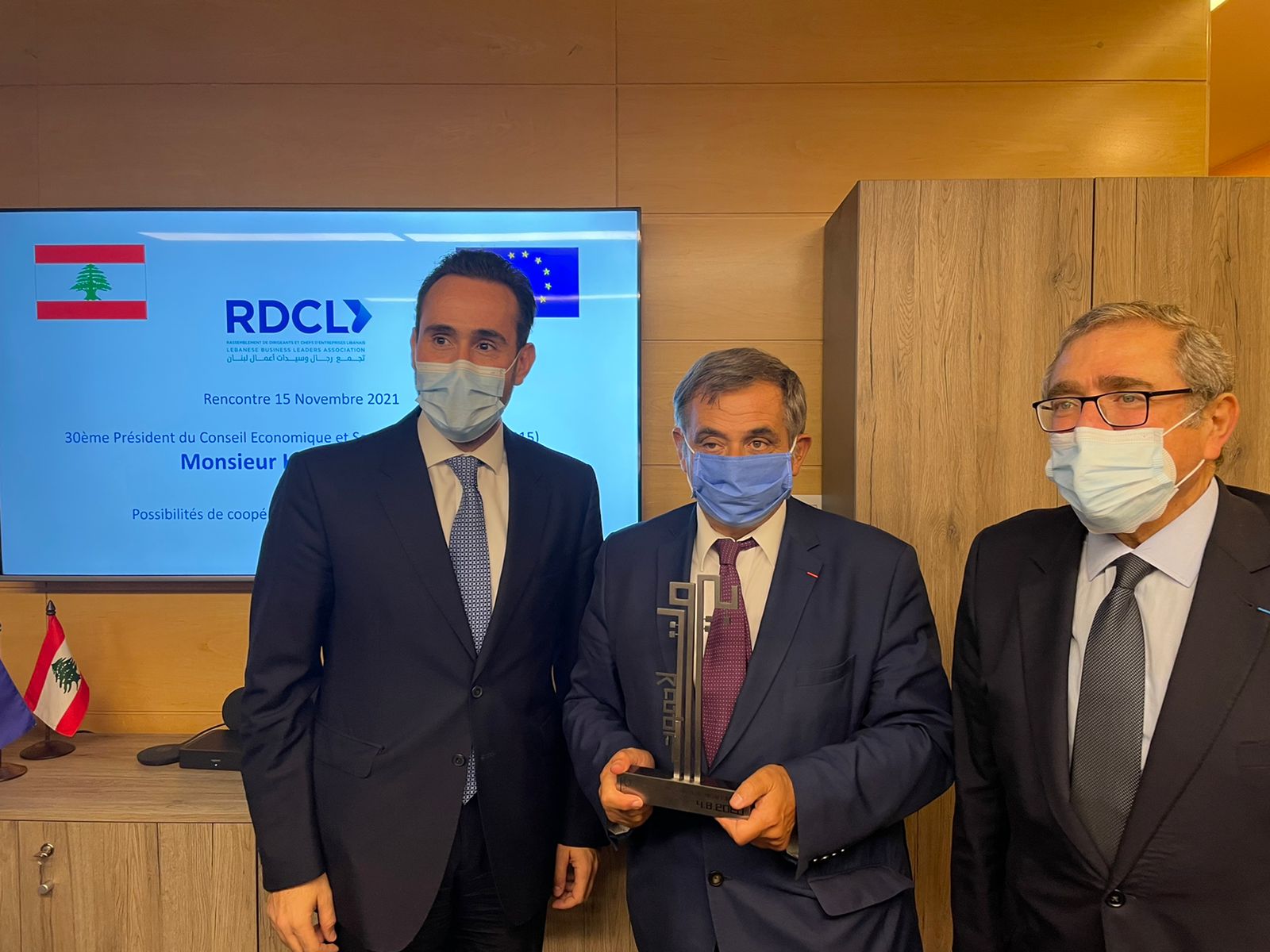Beirut, November 16, 2021: The Lebanese Business Leaders Association (RDCL) hosted the 30th President of the European Economic and Social Committee (2013 – 2015) Mr. Henri Malosse, on Monday, November 15, 2021, at 5:00 p.m. at the association’s headquarters in downtown Beirut.
Mr. Nicolas Boukather, president of the RDCL, delivered a welcome speech in which he thanked President Malosse for his presence, his friendship, and for his constant interest in Lebanon, and also welcomed Mr. Gemayel, president of the association of industrialists. In addition, he insisted on the importance of this visit given the difficult and exceptional circumstances that Lebanon is going through, constituting an opportunity based on his experience to engage in a constructive discussion on the means of rebalancing trade between Lebanon and the European Union, as well as the importance of the strategic role that Lebanon could play through a particular positioning vis-à-vis the European Union, particularly in view of the diplomatic crisis that recently broke out with the countries of the Arabian Gulf. Likewise, he stressed the importance of insisting on a political stance around the sovereignty and neutrality that the Lebanese aspire to. Boukather finished his speech by specifying that, despite the feeling of being hostages of an extremely difficult geopolitical situation, the business leaders of the association will never give up and will continue to play their pioneering role through the private sector, which is the foundation of the national economy. Boukather also mentioned the national document recently prepared by the RDCL, through which the association explains its vision of a new Lebanon based on cohesion and agreement between all its constituents, as well as on innovation and economic competitiveness, calling for a neutral and decentralized state, and an independent justice. He finally insisted on the vitality of the social, economic and political stability of the country, as well as on the importance of the message of Pope John Paul II on the coexistence that Lebanon reflects, which makes it extremely important for the stability of Europe.
For his part, Mr. Henri Malosse focused during his intervention-debate at the RDCL on the importance of improving cooperation between Lebanon and Europe. Malosse discussed possible ways of strengthening the partnership between Lebanon and Europe, while stressing the need to preserve the long and very deep history of friendship and neighborhood that binds them together. He added that Lebanon can, especially through the private sector and business leaders, turn the current crisis into a real opportunity, while insisting on the need for a long and consistent work, even if it is undertaken in small steps, to start making the desired change.
Likewise, Mr. Malosse indicated that trade relations between Lebanon and Europe can be considerably improved and modernized, stressing that the current trade balance between Europe and Lebanon is totally unbalanced, since Europe exports to Lebanon about 20 times more products than Lebanon exports to the European Union. In addition to trade relations, Mr. Malosse noted that France will chair the European Council starting January 1, 2022. He indicated that the European Union led by France, should adopt a political discourse that insists on Lebanon’s sovereignty and independence. Finally, Malosse considered that Europe should help Lebanon through the development of its human skills, seeking to keep them in Lebanon instead of attracting them to Europe.
At the end, Mr. Malosse listened attentively to the aspirations that Lebanese investors and managers and business leaders expect from the European Union, especially with regard to investments and assistance in training, but also services and the exchange of skills. RDCL members attending the event stressed the importance of Europe’s social assistance. They also expressed their wish to see a change in the trade balance between the EU and Lebanon and the need to review trade agreements as well as Lebanon’s export mechanisms. Financially, they demanded the creation of connections between Lebanese SMEs with European banks. On a political level, they called for a clear and firm position on the part of Europe on the freedom and sovereignty of Lebanon. Finally, they insisted on the importance of holding the legislative elections on time and without any delay, as well as of the European aid for the digitalization of the electoral process, and for the establishment of electoral mega-centers.

